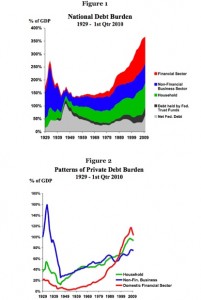
Can the US Have an Expansionary Fiscal Contraction?
All … the attached essay was written by Simon Johnson, Ronald Kurtz Professor of Entrepreneurship, MIT Sloan School of Management; Senior Fellow, Peterson Institute for International Economics; and co-founder of Baseline Scenario. Johnson used to be Chief Economist of IMF and is, IMO, one of the sanest voices in economics. It summarizes his recent testimony to the Joint Economic Commitee of Congress. The question is — Should we reduce federal debt to slow the build up of private debt? He lays out 4 reasons why such a contractionary fiscal policy will create even worse problems.

His penultimate paragraph places the real issue — who is going to pay for the liquidation of the private bubble (see chart below, which I compiled from Fed. Reserve data) into context (the red typing is mine to clarify the ambiguity in his double use of debt). Also, I urge you to read his testimony (you can download it from the link indicated below) — it is more detailed and he has a brief discussion about how the cost of the financial meltdown (looming private debt liquidations — particularly the bubbles of debt in the financial and household sectors — which Fig 2 shows has not really begun to bite) are being shifted to the middle class. Note, the rise in the light gray area in Figure 1 is the spike in federal debt that has taken place since the meltdown.
Chuck
What happened to the global economy and what we can do about it
Could The US Have An “Expansionary Fiscal Contraction”?
By Simon Johnson. My full written testimony to Tuesday’s hearing of the Joint Economic Committee of Congress is available here.
The US has a large budget deficit and a debt-to-GDP ratio that, in most projections, continues to rise over time. Some House and Senate Republicans are arguing strongly that this situation calls for large and immediate cuts to government spending, for example as part of any agreement to increase the federal government’s debt ceiling.
The Joint Economic Committee of Congress held a hearing on Tuesday to discuss whether such spending cuts would be “contractionary” or “expansionary” for the economy in the short-run. My assessment, after participating as a witness at the hearing, is that large immediate spending cuts would tend to slow the economy (a webcast of the hearing is here).







